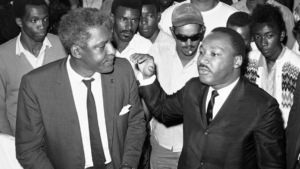Introduction
Specific names have been passed down in the history of the civil rights movement as legends. But even though their stories were disregarded, some unsung heroes had essential roles to play. Bayard Rustin is one such hero. Rustin made significant contributions to the movement, but his reputation has frequently been overshadowed. Let’s examine this important figure in black history’s life and legacy.
Early Life and Activism
Bayard Rustin was a key player behind the scenes when the Montgomery Bus Boycott was launched in 1955 due to Rosa Parks’ refusal to give up her bus seat. He arranged a workshop to teach activists nonviolent protest techniques and counselled Martin Luther King Jr. on the virtues of it. He was influenced by the teachings of Mahatma Gandhi and joined the Fellowship of Reconciliation (FOR), a pacifist organization that advocated for racial equality.
The March on Washington and “I Have a Dream”
In 1963, Bayard Rustin played a crucial part in planning the historic March on Washington for Jobs and Freedom, one of his most memorable accomplishments. Rustin, the primary organizer, inspired thousands to seek economic and civil rights peacefully. Martin Luther King Jr.’s famous “I Have a Dream” speech, which marked the march’s conclusion, helped the movement reach new heights. The march became a turning point in American history thanks mainly to Rustin’s strategic preparation and perseverance.

Challenges and Legacy
Bayard Rustin overcame several obstacles during his life, despite his outstanding contributions. He was marginalized within the movement due to his open homosexuality, which generated controversy. Due to the way his sexual orientation frequently eclipsed his accomplishments, Rustin is commonly left out of historical accounts. His legacy is still important, though. He left a lasting legacy on the civil rights movement and laid the way for subsequent social justice movements with his dedication to nonviolence, organizing prowess, and strategic leadership.
Conclusion
Bayard Rustin’s role as an unsung civil rights movement hero deserves recognition. His strategic brilliance, commitment to nonviolence, and organizational skills made him an invaluable asset to the movement. By telling his biography, we pay tribute to Rustin’s achievements and illuminate the underreported stories of black history, ensuring that his legacy will continue to motivate future generations.
Here is a list of some of Bayard Rustin’s notable accomplishments:
- Advisor to Martin Luther King Jr.: Rustin provided strategic guidance and training in nonviolent resistance to Martin Luther King Jr. during the Montgomery Bus Boycott and beyond. He was instrumental in shaping King’s philosophy of nonviolence.
- Historic March on Washington. He organized the attendees, oversaw the logistics, and ensured the event was peaceful. Martin Luther King Jr.’s famous “I Have a Dream” speech made the march famous.
- Nonviolent resistance- Rustin fervently supports nonviolent resistance and acts of civil disobedience. He actively engaged in workshops and training sessions on peaceful protest techniques and promoted the ideas of Mahatma Gandhi.
- Civil Rights Activism: Throughout his life, Rustin was involved in various civil rights activities, including organizing protests, advocating for desegregation, and fighting for voting rights. He consistently spoke out against racial discrimination and inequality.
- Rustin was a proponent of nonviolent conflict resolution and opposed the Vietnam War. He was also heavily involved in the peace movement. He stressed how various movements for justice and equality are interconnected.
- Work on International Human Rights: Rustin’s work went beyond American borders. He visited many nations, including India, to learn about and advance nonviolent resistance and human rights. Additionally, Rustin promoted awareness of South African apartheid.
- LGBTQ+ Advocacy: Rustin’s identity as an openly gay man in a time of widespread homophobia and discrimination was a significant aspect of his life. Later in his career, he advocated for LGBTQ+ rights, speaking out against bigotry and advocating for equality.
- Philanthropy and Education: Rustin dedicated his time and efforts to philanthropic endeavours, supporting various educational initiatives. He believed in the power of education to uplift communities and promote social change.
These accomplishments highlight Bayard Rustin’s multifaceted contributions to the civil rights movement, nonviolent resistance, international activism, and advocacy for equality and justice.


